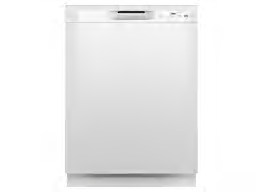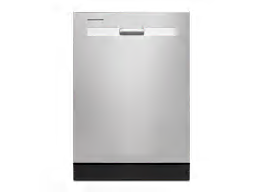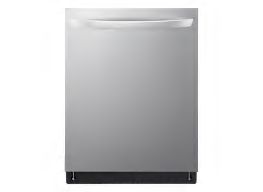Best Eco-Friendly Dishwashers of 2023
Our Green Choice designation will help you find a great dishwasher that's also easier on the environment
When you shop through retailer links on our site, we may earn affiliate commissions. 100% of the fees we collect are used to support our nonprofit mission. Learn more.

Modern dishwashers are impressively efficient: Unless you’re employing the most scrupulous hand-washing technique, machine-washing your dishes saves more water and energy. Beyond that, over 700 dishwashers on the market (about 89 percent) earn Energy Star certification from the Environmental Protection Agency, which indicates that the dishwashers meet a certain standard for energy efficiency: Thanks to features like soil sensors and efficient jets and rack design, a dishwasher with the certification costs around $35 a year to run, and can save up to 3,800 gallons of water over its life span.
But appliances affect the environment beyond the amount of water and energy they use. Consumer Reports’ Green Choice designation on a dishwasher means that model uses less energy in its operation, and the manufacturing process and the materials used have a lower environmental impact as well. “Sustainability is about minimizing the impact on the environment for any product from cradle to grave—all that is required to make it, use it, and dispose of it,” says Shanika Whitehurst, CR’s associate director of product sustainability.
And given that 90% of Americans in a nationally representative CR survey of 2,088 US adults in January 2023 (PDF) said they felt individuals should be at least somewhat responsible for protecting the planet, we want the Green Choice designation to make choosing the right appliances easy.
What Makes a Dishwasher a Green Choice?
To earn CR’s Green Choice designation, dishwashers must stand out in a variety of key environmental assessments, some of which affect the dishwashers’ Green Choice score more heavily than others. For instance, a dishwasher cycle’s energy consumption will affect a Green Choice score more significantly than whether or not it has a self-cleaning filter with a grinder (a feature that causes a machine to use up slightly more energy).
Here are the major factors that go into a dishwasher’s Green Choice score.
Water efficiency: In our labs, we measure a dishwasher’s water consumption on our intentionally difficult washing performance test. The Energy Star certification requires standard dishwashers to use no more than 3.5 gallons per cycle—but in reality, the vast majority of Energy Star models we’ve tested use between 4 and 5 gallons per load, though a few standout models use a bit less. That’s not to say that Energy Star designations are wrongly applied: It’s a matter of how the machines are tested. “We use special loads in the dishwasher to trigger the soil sensors to deliver the maximum water and energy usage,” says Jim Nanni, CR associate director and appliance team testing leader. The test for government certifications, on the other hand, “uses an essentially clean load of dishware.”
Because so few dishwashers actually meet the rigorous standard of 3.5 gallons per cycle (at least when it comes to very dirty dishes), our Green Choice standards allow for more water usage—some as much as 4 to 5 gallons to get a load of dishes clean.
Green Choices at CR
• In autos, we identify the vehicles that produce the fewest pollutants.
• Only the top tier of efficient washers earn our green leaf.
• It’s part of our efforts to build a more sustainable future for all.
For more, see CR’s Guide to Sustainable Living.
Because our dishwasher ratings already account for reliability, water use, and energy use, many of our Green Choice dishwashers are also among our top-rated models overall. CR members can read on for a list of dishwashers that not only ace our performance tests and rate highly in our member surveys but also are a Green Choice model. Consult our dishwasher buying guide as you shop. CR members can also see CR’s complete dishwasher ratings for even more options.
Best Eco-Friendly Dishwashers
Here are five of the most noteworthy Green Choice models, with strong scores on our performance tests, sold by brands that received great feedback on member surveys.



























